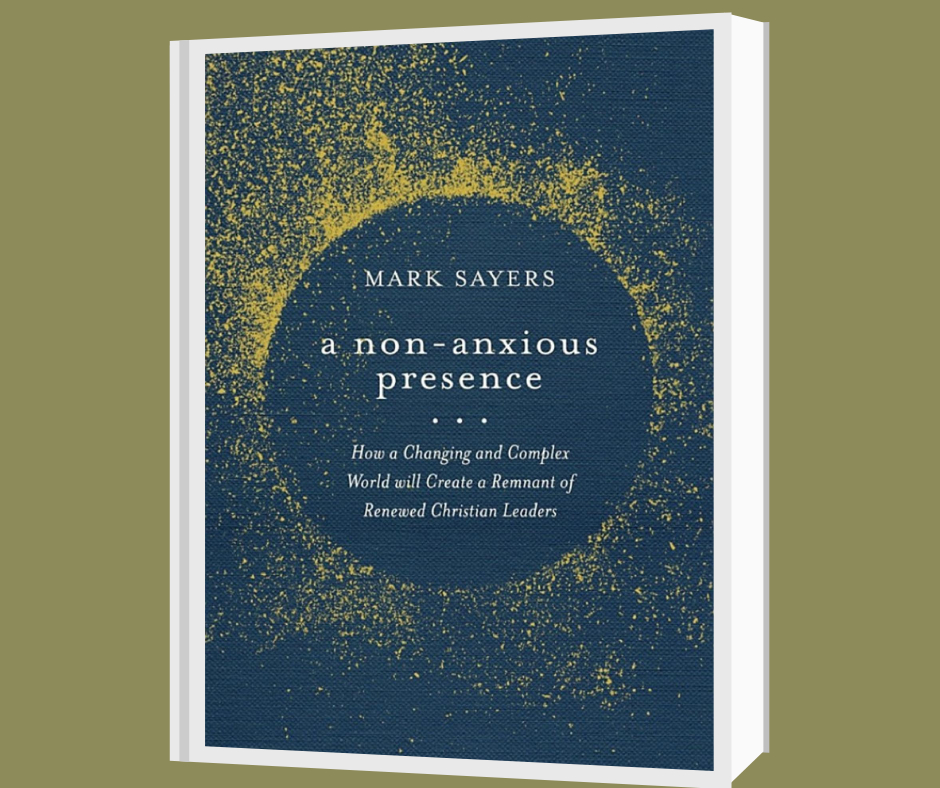Book Reviews
a non-anxious presence: How a Changing and Complex World Will Create a Remnant of Renewed Christian Leaders, by Mark Sayers | Review by Rosa Byler

“No one dresses up for funerals anymore,” complains a ninety-four-year-old friend. Rudeness goes viral in public forums; conventions are flouted and etiquette ignored. “Experts” in almost any field, bolstered by a chorus of internet yes-voices, insolently contradict authorities of legitimate research and experience. Institutions collapse, undermined by relational and cultural conflicts masquerading as battles for truth. Are such changes and complexities due to social adaptations? Generation gaps? A post-Christian society? Original sin? Yes.
In addition, Mark Sayers points out that our environment is changing. We are in a “gray space,” a wilderness between two sociological eras, moving from a complicated to a complex era. Such a seismic cultural shift results in widespread anxiety. Leaders typically take the brunt of this general insecurity and can easily succumb to it as well; yet in God’s economy, wildernesses are places of spiritual growth. Sayers says that God “seeds” gray spaces with the potential for renewal. Opportunities abound! Leaders who demonstrate a non-anxious presence trust and can reassure others that God is still sovereignly working out His purposes. This book’s purpose is to instruct and encourage such leaders.
Two sections describe the problem and its background. The last and longest sketches out non-anxious-leader formation. Sayers is a gifted teacher and obviously familiar with the learning style of the modern mind: chapters are short and concepts boldfaced, illustrated with diagrams, repeated as Key Ideas, and summarized at the end of each chapter. For maximum creative impact, sections begin with mottled gray and white title pages.
The problem: societies base their understanding of leadership on a set of cultural assumptions, and Sayers sees the “American century” as ours. In that system, power has belonged to central institutions that use strategic vision, planning, and efficient execution as keys to flourishing. In today’s decentralized and networked society, however, power is fluid. Adaptability and resilience outperform institutional structure and efficiency. Yet a networked world is more conflicted and anxious—and anxiety spreads rapidly (via the network!) through entire organizations, from businesses to faith communities.
Sayers makes good use of the biblical metaphors wilderness and stronghold. Wildernesses, to the Hebrew mind, were “places of challenge and confrontation…outside of protective walls, both physical and relational.” (176) In a wilderness, isolated from our strongholds and stripped of independence, we realize (as did David) that God is the ultimate stronghold and security. The psalms are full of allusions to God’s close presence in the wilderness.
Strongholds, protective structures for growth but also for “security, safety, and prosperity in a threatening, chaotic, and unpredictable environment” (67), are designed to “keep the bad out” and maintain a lifestyle that is “comfortable, at ease, and unchallenged by external distractions” (107). Yet they tend to create pride and a sense of entitlement. Fruit comes to be expected without the process and hard work of growth. A stronghold can take on a life of its own, and leaders continue on the “secular autopilot” of their expected cultural foundation rather than dependence on God.
Strongholds in Scripture are in opposition to God, and He frustrates them—sometimes with immediate Gen. 11 effectiveness but more often gradually, through cultural shifts. His people find themselves in wildernesses, where their true character shows up. Understandably, anxious inhabitants of crumbling strongholds resist growth and oppose leaders who move toward spiritual renewal. Reactivity, conflict, and retreat supplant reflection and thoughtfulness. Entire organizations can lose not only their vision but even the ability to identify their dysfunction. (98-99)
Leadership has never been easy, and the aim of Christian leadership (moving people toward growth in Christlikeness) is against human nature: Sayers comments that individuals and their systems prefer the ease and comfort of emotional and spiritual immaturity. (111) Wilderness settings such as the current time only intensify the difficulties of leadership. Along with anxiety and cultural pressures, today’s leaders face their own “ideological baggage…[carrying] yesterday’s strategies, unwilling to see how the environment and context” have changed. (159)
A contrasting healthy adaptability is evident in the very different ways American generals faced the two Gulf Wars. Their correct analyses and helpful solutions, though, fall short of what Sayers calls “King David’s strategic approach.” (161) He points out that the Bible freely uses man’s military imagery while managing to suggest a higher version: David’s startling victory over Goliath illustrates “kingdom power laws” that do not follow military expectations. A heavenward orientation (spiritual vision) is crucial to non-anxious leadership. It is only developed by long intimacy with God—and, as one might suspect, generally takes place in uncomfortable wildernesses.
The above are just a few takeaways from a short and easily read but reassuring and instructive book. Sayers has obviously thought long and well about culture and its influence on the church. (That an Australian pastor under a lengthy COVID lockdown in Sydney could write with such broad cultural and pastoral awareness is in itself an indication of how networked our system has become.) This book has potential to inspire leaders as well as inform and hearten anyone puzzling over troublesome new dynamics in his family, community, church, town, country… Its depictions of cultural changes may temporarily cause more anxiety, but Sayers’s resolution, praise God, is hope-filled.